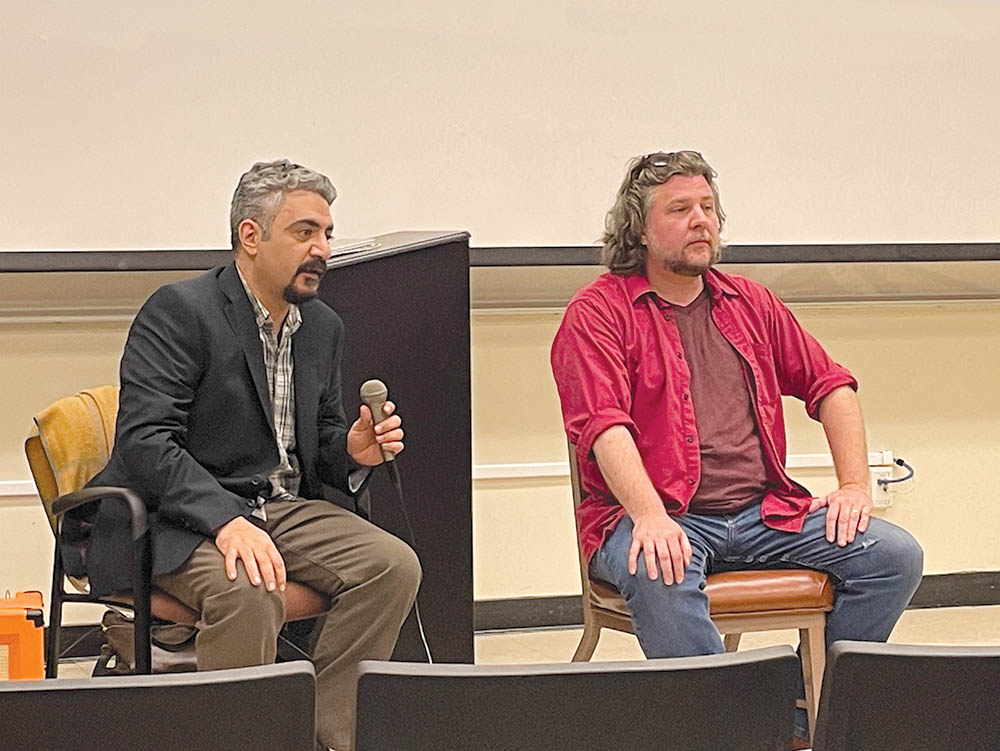
Photo: Andrew Hagopian
Andrew Hagopian
Editor
“It starts out, and it’s a string quartet, which is a bad sign because it is not what I want. I want truth. I want down right folk truth. Then this voice comes out of the record and I immediately thought, oh, I like you,” said Ian Nagoski, when first listening to the voice of soprano Zabelle Panosian.
On Thursday, October 13, 2022, the Armenian Studies Program at Fresno State hosted a lecture entitled “I am Servant of Your Voice: Armenian-American Soprano Zabelle Panosian, 1891-1986,” with guest presenters Ian Nagoski and Harout Arakelian.
Nagoski is a music researcher and record producer in Baltimore, Maryland. For more than a decade, he has produced scores of reissues of early 20th century recordings in languages other than English for labels including Dust-to-Digital, Tompkins Square, his own Canary Records, and others. Arakelian is music collector and researcher based in Los Angeles, California. His research focuses on Armenian musicians of the 19th and 20th century and their contributions to Armenian culture. Arakelian studies the experiences of migrant Armenian musicians, following their careers and personal lives in America.
The lecture began with Nagoski explaining his interest in world music and his contributions to restoring and archiving old records. He started collecting world records after falling in love with the concept of folk artists and their dedication expressing themselves or their communities. Nagoski then related a personal story of how he came across a partially broken, orange label Columbia record which intrigued him since Columbia labels were usually green. The record was that of soprano Armenian singer Zabelle Panosian, born circa 1891, in Bardizag, Turkey.
Zabelle Panosian was among the most significant voices of the post-genocide generation of Armenian-Americans.
She contributed to the Armenian music scene through recordings with major labels including Columbia Records, personally raising millions of dollars for Armenian relief by organizing benefit concerts in the early 1900’s. During her career she became acquainted with other Armenian musicians and composers such as tenor Armenag Shah-Mouradian and Komitas Vartabed.
Nagoski shared many interesting facts about Panosian’s life and her travels. He then played short clips of her recordings “Groong” (Crane), “Kilikia” (Cilicia), and “Charmant Oiseau” (from “La Perle de Brésil”). “Groong” is a song which symbolizes the longing of displaced Armenians for their homeland.
Arakelian concluded the discussion by sharing documents, newspaper clippings, posters, and memorabilia pertaining to the life and career of Panosian. Arakelian stated that “Panosian’s music is derived from a syncretic experience of the Western Armenian village near the sea of Marmara where she was born and a passion for the coloratura sopranos she encountered in Boston.”
Zabelle Panosian: I Am Servant of Your Voice is available from Abril Bookstore at http://www.abrilbooks.com/zabelle-panosian.html or from the National Association for Armenian Studies and Research (NAASR) at https://naasr.org/products/zabelle-panosian-i-am-servant-of-your-voice.
 Hye Sharzhoom Armenian Action
Hye Sharzhoom Armenian Action